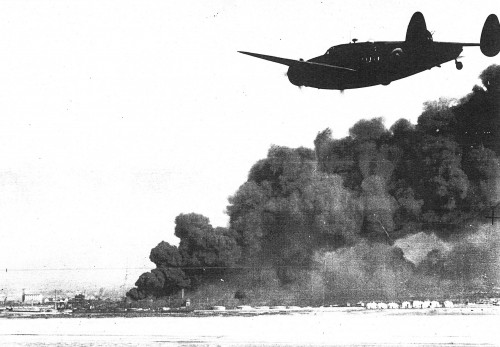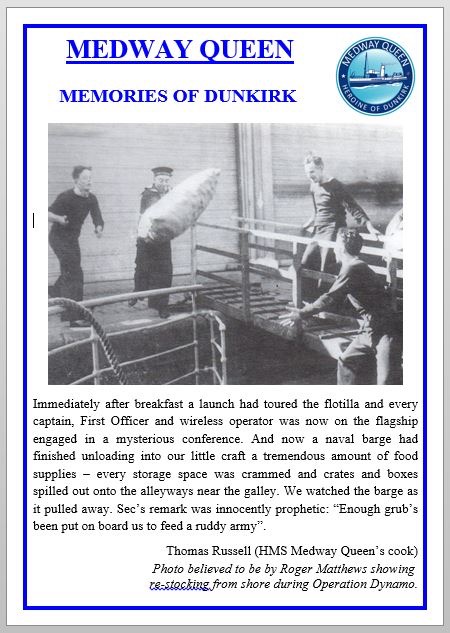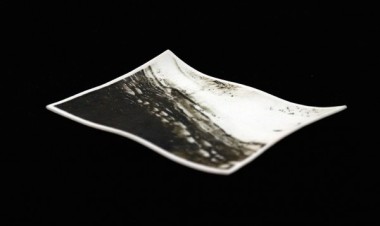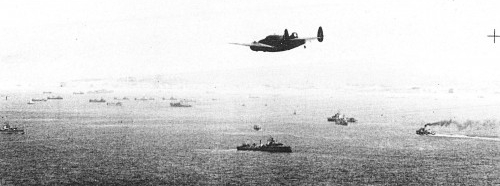
Photo taken from RAF reconnaissance plane overlooking Dunkirk 1940, from the collection in the Imperial War Museum photography archive
Station Commander ‘Boy’ Bouchier assembled all the pilots in the billiards room in the officer’s mess, to tell us we had been assigned to take part in the protection of the British troops over Dunkirk. For fourteen days we went non-stop. I did something like thirty-seven hours in ten days. We just kept flying. We had no reserve pilots.
(Squadron Leader Al Deere, New Zealander, 54 Squadron RAF, from Max Arthur’s Forgotten Voices. We’ve been hearing from Al Deere over the last couple of days about getting shot down over Dunkirk, leaving his wrecked plane on the sand-flats north-east of the town, getting stitched up with a needle and thread by a French handywoman, and encountering two discouraged Tommies in a cafe on his way to join the evacuation queue. His story continues on later pages.)
Dunquerque had been frequently and heavily bombed daily and nightly for some weeks; it was on fire in many places, and blazing to heaven from its oil tanks. For the next week, bombs must have fallen on or near it every five minutes. The enemy sent over immense flights, in the almost certainty of success. They had a perfect target beneath them, columns crowded on roads, shipping crowded in a channel, masses of men upon a beach. During the week there were three hundred and fifty thousand men shut in within a narrow compass with all their possessions; any bomb dropping was certain to be destructive. This was to be an annihilation.
(John Masefield, from The Nine Days Wonder)
The tide was fairly low. A steamer lay on her side at the water’s edge. The sandy beach was about 100 yards wide. Down the centre stood the line of men, three abreast. The smoke from the burning oil tanks drifted eastwards over the town. A few officers walked up and down. All was quiet. And then it started! A formation of high fliers came up from the west, and dropped stick after stick of bombs.This first attack was most unnerving. You felt so completely exposed on the beach. For a time some of us huddled under the hull of the wrecked steamer, but as nothing happened for some time, I called in all my men, and formed them up in the queue again for fear we should lose our place.
During the early evening I heard a Stuka coming down in a vertical dive right on top of me. I was by now dulled by hours of explosions so the the imminence of death aroused no great feeling of fear. Either the bomb would land on me, or it wouldn’t. I thought of Margaret in those few seconds of suspense, and she brought me a sort of peace of the spirit. The next moment: Crash! Darkness! And then a vision of falling sand in front of me. I realised I had been missed, and I could hear the plane climbing away over Dunkirk. The attack was over.
(Gunner Lt Elliman’s account from Hugh Sebag-Montefiore’s Dunkirk)
The Constant Nymph, with Dr Basil Smith and his two ratings were off Dunkirk – ferrying load after load of French troops to the Dutch schuit Jutland. The excitement staved off hunger which was just as well – the Navy had given them a sirloin of beef and a sack of potatoes but the little boat boasted only a two-burner Primus.
(Richard Collier, from The War at Sea, ed. John Winton)

We got into Dunkirk around five o’clock in the evening – we hadn’t eaten and it was really chaos. The sand was littered with bodies and crowds of chaps all hoping to get off but there was no hope. They tried to organise queues, but it was very difficult. People were not only being Stuka-ed, but there was also panic on the beaches. On one occasion, a small boat came in – and they piled aboard it to such a degree that it was in danger of capsizing. The chap in charge of this boat decided he must take some action. He ordered one man who was hanging on the side to get away – but he didn’t, so he shot him through the head. From the people around there was no reaction at all.
It was bitterly cold at night. I came out of the water and I removed a corporal’s overcoat from a corpse on the beach. There was a very flimsy canoe, and two chaps paddled out in this canoe. A Stuka had come down and machine-gunned them, and they both leaned the same way – and they were both drowned. The canoe was upside-down, floating some way off the beach. Bill swam out and pulled it ashore, and we paddled out. HMS Whitehall came past us with its guns blazing away at those Stukas, threw us a line and we were pulled aboard.
(Sergeant Leonard Howard, 210 Field Company, Royal Engineers, from Max Arthur’s Forgotten Voices)
The Tom Tit was ‘stolen on impulse and without authority’ by Ron and Alan Tomlinson, and in her they made 16 trips ferrying men to the big ships. The Tollesbury, a 1901 barge from the Thames near Erith went with all her crew who volunteered; the Windsong, another sailing boat, must have been at considerable risk, being not very swiftly manoeuvrable, reported as ‘ready for sea and able to take 30 passengers’ – she made several trips and brought many men home.
(Ships’ stories from several sources including the website of the Association of Little Ships of Dunkirk. More little ships’ stories throughout the nine days, and HMM Medway Queen is the first of a new series of features on the heroic little ships.)
Our operations over Dunkirk fell into two main categories. One was that we would do a fighter sweep. We would sweep all the way round, behind the beaches and try and intercept any German aircraft coming up to attack the soldiers on the ground. In the other role, we would escort a bomber called the Blenheim, and be their fighter escort when they went to bomb targets that were related to the evacuation from Dunkirk. I think our ground crews were the people who got into more fisticuffs in local pubs, because after a few beers the soldiers would say, ‘Where were you?’ and our ground crews knew very well that we’d gone over there.
(Flying Officer Geoffrey Page, 56 Squadron, RAF, from Max Arthur’s Forgotten Voices)
Mrs Richardson told me of a friend of her husband’s dead on the beach at Dunkirk – not a wound – shock. News of Louie’s brother, the West boy [Harry] landed in a sailing boat at Ramsgate – hunting his battalion – no clothes – won’t go back he says; but gives no word of his wounds. Some say he’s the only survivor of his regiment.
(Virginia Woolf’s diary. More news of Harry West on 2nd June)
We met the men coming back and drove them to hospital. They were in torn, oily, wet uniforms – one officer had nothing on but a blanket and a monocle – and their faces were black and covered with oil. All the men said: ‘Where were our bloody planes? Never saw one.’
(Lavinia Holland-Hibbert, FANY, from Anne de Courcy’s Debs at War)
After the nightmare of the retreat, Captain Snook’s experience of the evacuation was not much better – ‘the din was appalling’. On the beach, he met five survivors of the destroyer Grenade which had just been blown up. Together they got into a little boat they found and set off for England, but the engine conked out halfway. Stranded for a while, they were eventually picked up by a trawler, and at last landed in Ramsgate.
(Captain HS Snook’s letters containing his account of Dunkirk are in the Imperial War Museum)
I will pay my tribute to these young airmen. The Knights of the Round Table, the Crusaders, all fall back into the past not only distant, but prosaic, before these young men, going forth every morn to guard their native land and all that we stand for, holding in their hands these instruments of colossal and shattering power.
(Winston Churchill, 4th June 1940, in his speech to the House of Commons, reported by Sarah Gertrude Millin in World Blackout, her record of the first year of the war.)

Here in the sand we grovelled, with the burning town as back-drop, the flash of guns and bursting bombs as light and sound effects. Cold, hungry and despondent, we were sure we had been forgotten and deserted. With the first light of dawn the Luftwaffe and Wehrmacht began, again, to hurl exploding horror at this sandy shore and at the ships, yachts, and all the other vessels of that noble company. For us there was a gruelling twelve-kilometre march along the loose sand to march into the sea up to our necks only to march out again, a hellish diversion to be repeated again and again.
(Ken Anderson LAC, from Robert Jackson’s Dunkirk)
Many German pilots whose planes were shot down over Dunkirk were killed by small arms fire as their parachutes floated down. One who survived was First Lt. Erich von Oelhaven, who landed among the dunes, was captured by soldiers, and after a day sheltering in a foxhole in the sand from his colleagues in the air, was taken at gunpoint to queue for a trawler on a makeshift jetty of abandoned trucks.
Observing that his armed guard was asleep on his feet, he escaped into the sea, and sheltered for hours between the jetty trucks, unable to stand as the tide came in, and floating with his head jammed in a pocket of air, while the Stukas and German artillery continued to pound the beach and the sea. He survived hunger, extreme thirst and concussion, for several days and nights until 4th June, when he emerged from hiding and collapsed onto the deserted beach, to be found later by German soldiers.
(Story from Robert Jackson’s Dunkirk)
The German planes, about forty big two-engined bombers, flew on steadily in formation. They appeared to be approaching the direction of the road. If so we were for it. They couldn’t miss the target of the crawling column inextricably mixed up with all these thousands of foot-slogging, weary troops. Already there were big bomb craters lining the sides of the road, showing us it had not escaped attention on previous occasions.
A mad rush for cover started. Men packed themselves into ditches, crawled underneath the wreckage of vehicles, flattened themselves down between the very grass blades in the fields, and stood up to their necks in the water of the canal. In the space of a few seconds the mass of humanity that had encumbered the road had utterly vanished. Not a soul was in sight.
(From Gun Buster’s Retreat via Dunkirk. More on Y Battery’s rearguard action as they finally approach Dunkirk tomorrow 31st May)
Brigadier Beckwith-Smith’s instruction as to how to deal with Stuka dive-bombers: ‘Stand up to them. Shoot at them with a Bren gun from the shoulder. Take them like a high pheasant. Give them plenty of lead. Remember, £5 to any man who brings one down. I have already paid out £10.’
(from Lt. Jimmy Langley’s account in Hugh Sebag-Montefiore’s Dunkirk. More from Brigadier Beckwith-Smith on 3rd June)
The next day 30th left for La Panne east of Dunkirk. Reached there about 11pm and cruised about from 11 until 2am. It was most unpleasant as the whole place was on fire and the wind was blowing off-shore. [A fruitless trip, as the area was being so heavily shelled and bombed. The Royal Daffodil went back again the next day, nevertheless.]
(Captain G Johnson, on the Royal Daffodil. More from them tomorrow and every day until 2nd June)
How many men and women in this tiny country really listen with indifference to the hiccuping boom of the Nazi bomber as it passes overhead? The conquest of fear – and today it is conquered or effectively concealed by hundreds of thousands of decent citizens – is only the greater tribute to that unquenchable vigour of the human spirit which a whole nation displays. And for what? We in Britain are growing so accustomed to the demand made upon our endurance, our humour, and our self-control, that we have almost ceased to ask ourselves just why they are required. For what end is this people showing its superlative courage? For what purpose is it making, at incalculable cost, the emotional sacrifices involved in parting with children, abandoning homes, leaving husbands or wives in danger, closing down businesses, terminating professions, concluding social experiments which have embodied the hopes and dreams of a lifetime?
We are doing, permitting and enduring these things in order that we may destroy another great nation whose airmen, soldiers, sailors and civilians are also displaying superb gallantry and endurance. It may be that now we have no alternative but to fight on against the men and women who have endorsed and practised the militaristic creed which forces us to perfect the arts of destruction. But I who so dearly love my country and so deeply admire its brave and imperturbable people, refuse to admit that I am joining the defeatists when I inquire what would have happened if all the energy, courage and resourcefulness which is now dedicated to the work of destruction, had been given to seeking a solution for Europe’s problems while time still remained? This question has significance for the future.
(Vera Brittain, England’s Hour, written in the summer of 1940. More from Vera Brittain on 2nd June)
They say that in Europe there has never been a more beautiful spring. I look through a row of windows at a blue sky, at trees still green and many flowers, and I think they have these things now in Europe too. It seems to me quite inappropriate that men should be flying through these blue skies, travelling through these flowery fields, firing death at people in summer clothes. A man (high in the Colonial Service) told me after the last war how, one day in France, he went into the fields and picked some flowers and recited to himself, standing alone there in the woods, a poem of Keats, and then came back to his dug-out and made himself drunk; and he wept at the memory. Summer ought to be a closed season for killing people.
(Sarah Gertrude Millin, 28th May 1940, from World Blackout.)
 –
–
from A Young English Airman
Often unseen by those you helped to save
You rode the air above that foreign dune
And died like the unutterably brave
That so your friends might see the English June.
Yet knew that your young life, as price paid over
Let thousands live to tread that track to Dover.
(John Masefield)
To read the comments, or to add one, please click on this day’s date in the menu above left, and you’ll find the comments at the end of the page.
Tomorrow, 31st May 1940 – Lovely on the Water